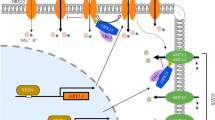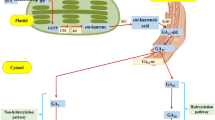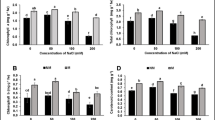Abstract
Lettuce is a popular fresh vegetable, and high-temperature stress will reduce the yield of lettuce. Spermidine is an essential phytohormone in plant stress responses. However, under high-temperature stress, it is not clear whether spermidine treatment can change the yield of lettuce by regulating sucrose metabolism. Here, treatment with normal temperature was used as a control, and the effects of 1 mM exogenous spermidine on the morphology, photosynthetic characteristics, and sucrose metabolism of lettuce under high-temperature stress were studied. The results showed that the high-temperature treatment unbalanced the synthesis and decomposition of sucrose, caused excessive consumption of leaf starch and sucrose, and reduced the yield of lettuce. The high temperature spraying exogenous spermidine treatment increased the photosynthetic pigment (chlorophyll a, chlorophyll b, and carotenoids) contents of lettuce under high-temperature stress and increased the net photosynthetic rate. The high-temperature spraying exogenous spermidine treatment promoted the up-regulation of sucrose-metabolizing enzyme (sucrose synthase, sucrose phosphate synthase, acid invertase, and neutral invertase) activity and sucrose-metabolizing enzyme gene (SS-like, SPS1, NIA and NIE) expression of lettuce under high-temperature stress. It increased the accumulation of leaf starch and sucrose, thereby forming a new sucrose metabolism balance. The current results show that spermidine effectively resists high-temperature stress and increases yield by improving sucrose metabolism.






Similar content being viewed by others
Data availability
All data, models, and code generated or used during the study appear in the submitted article.
Code availability
Not applicable.
References
Alcázar R, Altabella T, Marco F, Bortolotti C, Reymond M, Koncz C, Carrasco P, Tiburcio AF (2010) Polyamines: molecules with regulatory functions in plant abiotic stress tolerance. Planta 231:1237–1249. https://doi.org/10.1007/s00425-010-1130-0
Baroja-Fernández E, Muñoz FJ, Li J, Bahaji A, Almagro G, Montero M, Etxeberria E, Hidalgo M, Sesma MT, Pozueta-Romero J (2012) Sucrose synthase activity in the sus1/sus2/sus3/sus4 Arabidopsis mutant is sufficient to support normal cellulose and starch production. Proc Natl Acad Sci USA 109:321–326. https://doi.org/10.1073/pnas.1117099109
Buysse J, Merckx R (1993) An improved colorimetric method to quantify sugar content of plant tissue. J Exp Bot 44:1627–1629. https://doi.org/10.1093/jxb/44.10.1627
Chon SU, Jang HG, Kim DK, Kim YM, Boo HO, Kim YJ (2005) Allelopathic potential in lettuce (Lactuca sativa L.) plants. Sci Hortic 106:309–317. https://doi.org/10.1016/j.scienta.2005.04.005
Collado-González J, Piñero MC, Otálora G, Lopez-Marín J, del Amor FM (2021) Exogenous spermidine modifies nutritional and bioactive constituents of cauliflower (Brassica oleracea var. botrytis L.) florets under heat stress. Sci Hortic 277:109818. https://doi.org/10.1016/j.scienta.2020.109818
Collins M, Knutti R, Arblaster J, Dufresne JL, Fichefet T, Friedlingstein P, Gao X, Gutowski WJ, Johns T, Krinner G, Shongwe M, Tebaldi C, Weaver AJ, Wehner MF, Allen MR, Andrews T, Beyerle U, Bitz CM, Bony S, Booth B (2013) Long-term climate change: projections, commitments and irreversibility. In: Stocker TF, Qin D, Plattner GK, Tignor MMB, Allen SK, Boschung J, Nauels A, Xia Y, Bex V, Midgley PM (eds), Climate change 2013: the physical science basis: contribution of working group I to the fifth assessment report of the intergovernmental panel on climate change. (Intergovernmental Panel on Climate Change). Cambridge University Press, Cambridge, pp 1029–1136
Fonseca de Lima CF, Kleine-Vehn J, De Smet I, Feraru E (2021) Getting to the root of belowground high temperature responses in plants. J Exp Bot 72:7404–7413. https://doi.org/10.1093/jxb/erab202
Formisano L, Ciriello M, Cirillo V, Pannico A, El-Nakhel C, Cristofano F, Duri LG, Giordano M, Rouphael Y, Pascale SD (2021) Divergent leaf morpho-physiological and anatomical adaptations of four lettuce cultivars in response to different greenhouse irradiance levels in early summer season. Plants 10:1–18. https://doi.org/10.3390/plants10061179
Frank G, Pressman E, Ophir R, Althan L, Shaked R, Freedman M, Shen S, Firon N (2009) Transcriptional profiling of maturing tomato (Solanum lycopersicum L.) microspores reveals the involvement of heat shock proteins, ROS scavengers, hormones, and sugars in the heat stress response. J Exp Bot 60:3891–3908. https://doi.org/10.1093/jxb/erp234
Fu GF, Song J, Li YR, Yue MK, Xiong J, Tao LX (2010) Alterations of panicle antioxidant metabolism and carbohydrate content and pistil water potential involved in spikelet sterility in rice under water-deficit stress. Rice Sci 17:303–310. https://doi.org/10.1016/S1672-6308(09)60031-7
Gazula A, Kleinhenz MD, Streeter JG, Miller AR (2005) Temperature and cultivar effects on anthocyanin and chlorophyll b concentrations in three related lollo rosso lettuce cultivars. Hort Science 40:1731–1733
Guo A, Hu Y, Shi M, Wang H, Wu YX, Wang YX, Ali B (2020) Effects of iron deficiency and exogenous sucrose on the intermediates of chlorophyll biosynthesis in Malus halliana. PLoS ONE 15:1–13. https://doi.org/10.1371/journal.pone.0232694
Hao JH, Su HN, Zhang LL, Liu CJ, Han YY, Qin XX, Fan SX (2021) Quantitative proteomic analyses reveal that energy metabolism and protein biosynthesis reinitiation are responsible for the initiation of bolting induced by high temperature in lettuce (Lactuca sativa L.). BMC Genomics 22:1–13. https://doi.org/10.1186/s12864-021-07664-5
Hawrylak-Nowak B, Dresler S, Rubinowska K, Matraszek-Gawron R, Woch W, Hasanuzzaman M (2018) Selenium biofortification enhances the growth and alters the physiological response of lamb’s lettuce grown under high temperature stress. Plant Physiol Biochem 127:446–456. https://doi.org/10.1016/j.plaphy.2018.04.018
Hoagland D, Arnon D (1950) The water-culture method for growing plants without soil. The College of Agriculture, University of California, Berkeley, CA
Huang H, Liu R, Han Y, Hao J, Liu C, Fan S (2021) Effects of exogenous spermidine on polyamine metabolism in lettuce (Lactuca sativa L.) under high-temperature stress. Pak J Bot 53:1571–1582
Jenni S, Yan W (2009) Genotype by environment interactions of heat stress disorder resistance in crisphead lettuce. Plant Breed 128:374–380. https://doi.org/10.1111/j.1439-0523.2009.01657.x
Kelly G, Moshelion M, David-Schwartz R, Halperin O, Wallach R, Attia Z, Belausov E, Granot D (2013) Hexokinase mediates stomatal closure. Plant J 75:977–988. https://doi.org/10.1111/tpj.12258
Kim MJ, Moon Y, Tou JC, Mou B, Waterland NL (2016) Nutritional value, bioactive compounds and health benefits of lettuce (Lactuca sativa L.). J Food Compos Anal 49:19–34. https://doi.org/10.1016/j.jfca.2016.03.004
Kusano T, Yamaguchi K, Berberich T, Takahashi Y (2007) Advances in polyamine research in 2007. J Plant Res 120:345–350. https://doi.org/10.1007/s10265-007-0074-3
Li C, Han Y, Hao J, Qin X, Liu C, Fan S (2020) Effects of exogenous spermidine on antioxidants and glyoxalase system of lettuce seedlings under high temperature. Plant Signal Behav 15:12. https://doi.org/10.1080/15592324.2020.1824697
Li C, Liu R, Han Y, Hao J, Liu C, Fan S (2019) Effects of exogenous spermidine on the growth and antioxidant enzyme activities of lettuce seedlings under high temperature stress. J Beijing Agric Coll 34:56–61
Li X, Gong B, Xu K (2014) Interaction of nitric oxide and polyamines involves antioxidants and physiological strategies against chilling-induced oxidative damage in Zingiber officinale Roscoe. Sci Hortic 170:237–248. https://doi.org/10.1016/j.scienta.2014.03.026
Li X, Zhang Z (2016) Experimental guidance of plant physiology. Higher Education Press, Beijing
Lichtenthaler HK, Wellburn AR (1983) Determinations of total carotenoids and chlorophylls a and b of leaf extracts in different solvents. Biochem Soc Trans 11:591–592. https://doi.org/10.1042/bst0110591
Liu R, Su Z, Zhou H, Huang Q, Fan S, Liu C, Han Y (2020) LsHSP70 is induced by high temperature to interact with calmodulin, leading to higher bolting resistance in lettuce. Sci Rep 10:1–9. https://doi.org/10.1038/s41598-020-72443-3
Luo H, Xu H, Chu C, He F, Fang S (2020) High temperature can change root system architecture and intensify root interactions of plant seedlings. Front Plant Sci 11:1–13. https://doi.org/10.3389/fpls.2020.00160
Ma G, Zhang M, Xu J, Zhou W, Cao L (2020) Transcriptomic analysis of short-term heat stress response in Pinellia ternata provided novel insights into the improved thermotolerance by spermidine and melatonin. Ecotoxicol Environ Saf 202:110877. https://doi.org/10.1016/j.ecoenv.2020.110877
Mathur S, Sharma MP, Jajoo A (2018) Improved photosynthetic efficacy of maize (Zea mays) plants with arbuscular mycorrhizal fungi (AMF) under high temperature stress. J Photochem Photobiol B Biol 180:149–154. https://doi.org/10.1016/j.jphotobiol.2018.02.002
Mostafaei E, Zehtab-Salmasi S, Salehi-Lisar Y, Ghassemi-Golezani K (2018) Changes in photosynthetic pigments, osmolytes and antioxidants of Indian mustard by drought and exogenous polyamines. Acta Biol Hung 69:313–324. https://doi.org/10.1556/018.68.2018.3.7
Mou B (2009) Nutrient content of lettuce and its improvement. Curr Nutr Food Sci 5:242–248. https://doi.org/10.2174/157340109790218030
Nahar K, Hasanuzzaman M, Alam MM, Fujita M (2015) Exogenous spermidine alleviates low temperature injury in mung bean (Vigna radiata L.) seedlings by modulating ascorbate-glutathione and glyoxalase pathway. Int J Mol Sci 16:30117–30132. https://doi.org/10.3390/ijms161226220
Pucher GW, Vickery HB (1936) Determination of starch in plant tissues. Ind Eng Chem Anal Ed 8:92–97. https://doi.org/10.1021/ac50100a004
Qin X, Li P, Lu S, Sun Y, Meng L, Hao J, Fan S (2020) Phosphoproteomic analysis of lettuce (Lactuca sativa L.) reveals starch and sucrose metabolism functions during bolting induced by high temperature. PLoS ONE 15:1–15. https://doi.org/10.1371/journal.pone.0244198
Ruan YL (2014) Sucrose metabolism: gateway to diverse carbon use and sugar signaling. Annu Rev Plant Biol 65:33–67. https://doi.org/10.1146/annurev-arplant-050213-040251
Sato R, Ito H, Tanaka A (2015) Chlorophyll b degradation by chlorophyll b reductase under high-light conditions. Photosynth Res 126:249–259. https://doi.org/10.1007/s11120-015-0145-6
Sato S, Kamiyama M, Iwata T, Makita N, Furukawa H, Ikeda H (2006) Moderate increase of mean daily temperature adversely affects fruit set of Lycopersicon esculentum by disrupting specific physiological processes in male reproductive development. Ann Bot 97:731–738. https://doi.org/10.1093/aob/mcl037
Shi H, Ye T, Chen F, Cheng Z, Wang Y, Yang P, Zhang Y, Chan Z (2013) Manipulation of arginase expression modulates abiotic stress tolerance in Arabidopsis: Effect on arginine metabolism and ROS accumulation. J Exp Bot 64:1367–1379. https://doi.org/10.1093/jxb/ers400
Wang Y, Zhang D (2000) Regulating effects of ethylene on carbohydrate metabolism in “starkrimson” apple fruit during the ripening period. Acta Hortic Sin 27:391–395
Yamori W, Hikosaka K, Way DA (2014) Temperature response of photosynthesis in C3, C4, and CAM plants: temperature acclimation and temperature adaptation. Photosynth Res 119:101–117. https://doi.org/10.1007/s11120-013-9874-6
Yan G, Zhang C, Zou Z (2012) Effects of exogenous spermidine on metabolism of nonstructural carbonhydrate and involved activity of enzymes of tomato seedlings under drought stress. Agric Res Arid Areas 30:143–148
Yan Z, Ma T, Guo S, Liu R, Li M (2021) Leaf anatomy, photosynthesis and chlorophyll fluorescence of lettuce as influenced by arbuscular mycorrhizal fungi under high temperature stress. Sci Hortic 280:109933. https://doi.org/10.1016/j.scienta.2021.109933
Yang S, Hao D, Jin M, Li Y, Liu Z, Huang Y, Chen T, Su Y (2020) Internal ammonium excess induces ROS-mediated reactions and causes carbon scarcity in rice. BMC Plant Biol 20:1–15. https://doi.org/10.1186/s12870-020-02363-x
Yang X, Han Y, Hao J, Qin X, Liu C, Fan S (2022) Exogenous spermidine enhances the photosynthesis and ultrastructure of lettuce seedlings under high-temperature stress. Sci Hortic 291:110570. https://doi.org/10.1016/j.scienta.2021.110570
Yu X (1985) Handbook of plant physiology experiments. Shanghai Science and Technology Press, Shanghai
Zhao H, Su T, Huo L, Wei H, Jiang Y, Xu L, Ma F (2015) Unveiling the mechanism of melatonin impacts on maize seedling growth: sugar metabolism as a case. J Pineal Res 59:255–266. https://doi.org/10.1111/jpi.12258
Acknowledgements
We thank the Ministry of Science & Technology of China, the Beijing Municipal Bureau of Agriculture and Rural Affairs, and the Beijing Municipal Education Commission provided financial support for this research. We thank American Journal Experts (AJE) for English language editing.
Funding
This work was supported by the National Key Research and Development Program of China (2016YFD0201010), the Beijing Innovation Consortium of Agriculture Research System (BAIC07) and the Science and Technology Program of the Beijing Municipal Education Commission (KM201910020012).
Author information
Authors and Affiliations
Contributions
QY: Investigation, Writing—Original Draft; WS: Investigation; YH: Resources, Writing—Review & Editing; JH: Writing—Review & Editing; XQ: Writing—Review & Editing; CL: Conceptualization, Writing—Review & Editing, Funding acquisition; SF: Conceptualization, Funding acquisition.
Corresponding authors
Ethics declarations
Conflict of interest
The authors declare that they have no known competing financial interests or personal relationships that could have appeared to influence the work reported in this paper.
Additional information
Communicated by Dawei Xue.
Publisher's Note
Springer Nature remains neutral with regard to jurisdictional claims in published maps and institutional affiliations.
Rights and permissions
About this article
Cite this article
Yu, Q., Sun, W., Han, Y. et al. Exogenous spermidine improves the sucrose metabolism of lettuce to resist high-temperature stress. Plant Growth Regul 96, 497–509 (2022). https://doi.org/10.1007/s10725-022-00800-5
Received:
Accepted:
Published:
Issue Date:
DOI: https://doi.org/10.1007/s10725-022-00800-5




